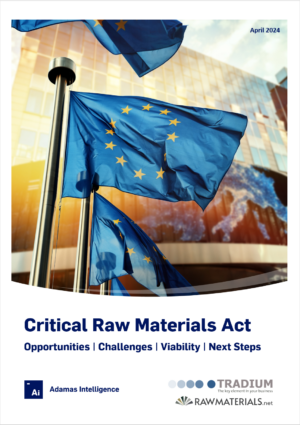NEW REPORT: Rare Earth Magnet Market Outlook to 2035

A comprehensive deep dive into the global market for NdFeB permanent magnets and the rare earth elements they contain
Adamas Intelligence is pleased to announce the publication of a new report, titled “Rare Earth Magnet Market Outlook to 2035”. This report is a must-read for anyone with a professional interest in the rare earth and permanent magnet industries.
Following a pandemic-induced lull in 2020, Adamas Intelligence data indicates that global consumption of NdFeB magnets jumped 18.1% in 2021 on the materialization of some latent demand from the year prior coupled with a surge in electric vehicle sales of all types.
Going forward, from 2022 through 2035 we forecast that global demand for NdFeB magnets will increase at a CAGR of 8.6%, bolstered by double-digit growth from electric vehicle and wind power sectors, translating to comparable demand growth for the rare earths elements (i.e., neodymium, praseodymium, dysprosium and terbium) these magnets contain.
Over the same period, we forecast that global production of neodymium, praseodymium, dysprosium and terbium will collectively increase at a slower CAGR of just 5.4% as the supply side of the market increasingly struggles to keep up with rapidly growing demand.
Among the findings of our analysis:
- Market for Magnet Rare Earth Oxides to Increase Three-Fold by 2035: With total magnet rare earth oxide demand forecasted to increase at a CAGR of 8.3% and prices projected to increase at CAGRs of 3.2% to 3.7% over the same period, Adamas Intelligence forecasts that the value of global magnet rare earth oxide consumption will triple by 2035, from US $15.1 billion this year to US $46.2 billion by 2035.
- Annual NdFeB Shortages of 206,000 Tonnes Expected by 2035: Constrained by an expected under-supply of neodymium, praseodymium, dysprosium and terbium oxide from 2022 onward, Adamas Intelligence forecasts that global shortages of NdFeB alloys and powders will amount to 66,000 tonnes annually by 2030 and 206,000 tonnes annually by 2035 – nearly one-third of the total market.
- Annual NdPr Oxide Shortages of 68,000 Tonnes Expected by 2035: Constrained by a lack of new primary and secondary supply sources coming to market from 2022 onward, coupled with the inability of existing producers to steadily increase output at the rate of demand growth, we forecast that global shortages of neodymium, praseodymium and didymium oxide (or oxide equivalents) will collectively rise to 21,000 tonnes annually by 2030 and 68,000 tonnes by 2035 – an amount roughly equal to China’s total production last year.






